Simple Days, Simple Joys of Serving Sai –
Anantapur Campus Notes
Vignettes of a life dedicated to women’s education – the inspiring example of
Mrs. Pushpa Ramanna
Ever a Student in Swami’s Presence
One of the earliest memories I have of Swami is His extraordinary attention to detail – He is perfection personified. I got a glimpse of this attitude when He invited the elite dignitaries of Anantapur for dinner on 1 August. The elaborate meal was arranged in the library , a very spacious hall . I have yet to recall a dinner that was so meticulously organized .
Another memory that comes to my mind is the visit of Sri Ravishankar Shukla, the former governor of Andhra Pradesh . During his visit, Swami organized a lunch in the staff room and personally supervised the arrangements.
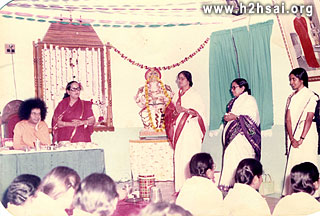 |
|
Serving lunch during a divine visit to Anantapur hostel, from left: Bhagavan Baba, Dr. Jayalakshmi Gopinath, Mrs. Pushpa Ramanna,Dr. J. Hemalatha and Dr. Poornashri Devi |
He even showed us the right way to place the chairs and indicated where the bowls, plates and glass must be kept and how the napkin must be rolled ! His personal interest in every detail was amazing and we learnt how much He detested slipshod work.
That same year - in 1971 - when some of us were sitting in the staff room, we received news that Swami would be coming to talk to us . I quickly got my kerosene stove, a packet of Nescafe and a steel tumbler from my room and kept everything ready.
As soon as Swami entered, I made some hot coffee with the Nescafe. When I offered it to Swami, He took it graciously and was just about to sit on the chair when He noticed the kerosene stove was still on. He immediately got up and blew it out saying, “Never waste anything.”
These are but a few memories that I have carried with me from my first year at the Anantapur campus.
Starting a Library from Scratch
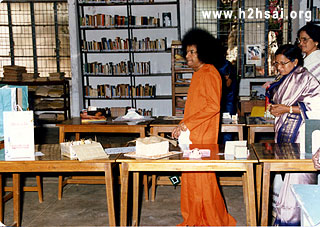 |
|
Bhagavan inspects the Anantapur library |
Swami assigned me to work in the library as there was no librarian then. I had to teach English for two years apart from managing the library , which had about 14 big racks to the wall and eight small racks that stocked over 10,000 books in all.
As the titles were not arranged in any methodical order and there was no accurate system of entry into the register, I had to start my work from scratch. Over time , I introduced processes that made the functioning of the library a lot more professional.
With no attendant to sweep the library, I would come before seven in the morning and ensure the entire hall was swept thoroughly before I resumed my duties between 7.00 – 7:30 a.m. I never set any limits for myself when it came to work, and was unmindful of the time.
All such efforts became even more worthwhile when Swami would make it a point to visit the l ibrary each time He was in the campus . Not just that, He would also instruct all visiting dignitaries to be taken around the premises.
During one of Swami’s visit to the library, I mustered enough courage to say that I needed help and appointing a clerk would be nice. I said to Him, “Okka clerk appoint chesthe baaguntudhi ”. To my request, Swami replied, “No, you should work with less people.” I considered His word to be yet another message – that we must learn to do things economically and efficiently.
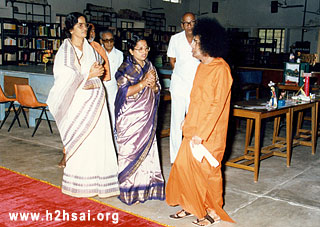 |
|
Answering the divine queries in the Anantapur library |
On 22 August, 1971, the ground floor of the hostel was readied and about four staff members and a few students moved in there. By the end of the year, the college had 60 students.
All of us stayed there happily, despite odds such as no electricity and brackish water from the wells. We had a kitchen so to speak, without any of the basic facilities. We cooked on an open fire and life was very simple.
People would say that the Anantapur water contains high levels of fluoride that leads to diseases such as arthritis. With Swami’s grace, until today I have not suffered from any such ailment, leave alone arthritis.
Throughout those early days while Bhagavan was personally setting up all the systems and the conveniences that we so easily take for granted now, it was only His unbounded love for us that kept us going. He just doted upon us like a divine mother.
Some years later, we started sourcing water from the taps and bore well s . Now, of course, we have the Sathya S ai Water!
His Amazing Presence in the Anantapur Campus
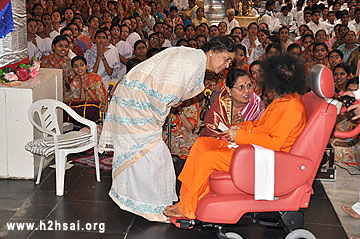 |
|
Mrs. Pushpa Ramanna and Principal Dr. Dwarka Rani Rao listen intently to divine command |
We had a visitor’s room in the hostel. You can find this room even now, but of course it is better furnished and more habitable. Back then, we would have bhajans in this room in the evenings. Swami would join us sometimes and I would make gajar halwa (carrot pudding) for prasad as I was the only one who had fair culinary skills! Swami would distribute the prasad and have some of it Himself. Although we considered Him our dear God, we felt He was one of our family members; His presence created such a homely feel.
Once, Swami stayed in His room at the Anantapur campus for about five days. Daily, we would serve Him breakfast in His room. Some of us teachers would accompany Him to the hostel for lunch and dinner and escort Him back although Swami Himself would never prefer us to do that. He would say, “Go, go, have your meals!”
Once while having our dinner, Swami came and asked the lady who was serving food, “Did you serve everything to the students that you have offered on My plate?” The lady replied, “No Swami, we have served You a few items extra.” Immediately, He said, “That is low bhakti (devotion). What you offer Me must be offered to everyone present here.” This was another message that He gave us – never to discriminate. |
Usually, Nagarsankirtan would be conducted at the campus only on Thursdays and Sundays. But when Swami would be in residence at the hostel, the students and the staff would daily chant the Omkaram and Suprabhatam and go around His building for Nagarsankirtan.
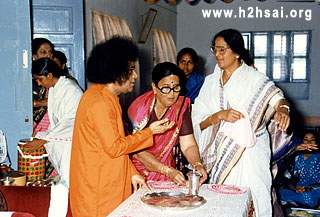 |
|
Hosting the Lord on campus |
During one of those days, in the month of October, I went with a student at 4:30 in the morning and stood in front of the balcony of Swami’s room . He came out and told us to go back to our rooms as it was very cold. He said, “You go now, I will come out later for Nagarsankirtan.” Swami was concerned as it was cold early in the morning, and we did have His darshan during Nagarsankirtan an hour later .
For vacations such as the Ugadi festival in March, we would organize a day trip for students to Prasanthi Nilayam to meet Bhagavan. We would board a bus at midnight and reach early in the morning .
When Swami was informed of our arrival, He would make arrangements for our stay in a book stall where you now have the Western Canteen . We would first freshen up there, and then go for darshan . Swami would speak to all of us so very sweetly and then we would go for early dinner as He would insist we should start our return journey to Anantapur before it got too late.
All is One, Treat Everyone Alike
Once while having our dinner, Swami came and asked the lady who was serving food, “Did you serve everything to the students that you have offered on My plate?” The lady replied, “No Swami, we have served You a few items extra.” Immediately, He said, “That is low bhakti (devotion). What you offer Me must be offered to everyone present here.” This was another message that He gave us – never to discriminate.
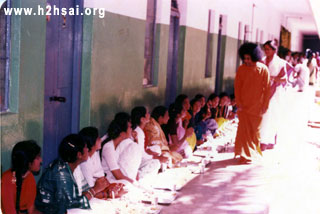 |
|
Bhagavan inspects lunch serving along hostel corridors |
In 1971, Swami organized the first month-long summer course for students, from May 1 to 31. As a large number of students enrolled for the course, from neighboring places as well, space was a big constraint. Swami made arrangements for the students and teachers to stay in the kalyana mandap.
We had to adjust in small and cramped spaces in order to accommodate everyone and manage with the limited number of bathrooms. Swami Himself took the morning classes and would remain in the premises throughout the day. He would talk to the boys and girls and conduct interesting evening discourses and bhajans.
Every Sunday, Swami arranged social work at different places around the Brindavan ashram. We would go as far as Whitefield to His General Hospital, and Swami would remind the students to work with all humility. He said, “Don’t feel shy to pick up the brooms and baskets to collect the garbage.” He also told us that for the students, the month-long experience was similar to a stay in a gurukuI (ancient hermitage-based learning).
He did not encourage visitors or parents to come to the campus for the entire duration of the course. Well-known speakers such as Professor Rajaratnam and Professor V.K. Gokak, as well as other key dignitaries were invited to address the students.
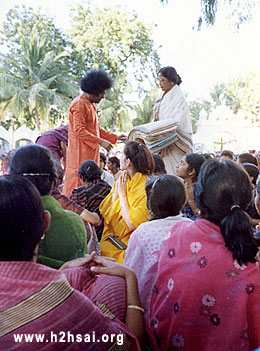 |
|
Lending a hand during saree distribution by Bhagavan |
At the end of the course, an examination was held. Swami took a group photo with all of us on the last day of the course and presented the teachers with saris in recognition of their hard work. Many such short camps have been held since then, but the first course was full of precious memories.
There are several other instances of Swami’s benevolence. I remember we had three sisters studying in the college and their father passed away. When Swami was informed about this by the warden, He immediately consented to pay the fees for all three of them to help them complete their education. One of the sisters is working with us now , while the other two are married.
Beyond all Shastras
In 1975, the Poornachandra Hall was under construction. That year, Swami decided to have a kumkum pooja during Dussera. I was told the pooja was being held after 12 years and would be conducted in the mandir.
When I heard about the kumkum pooja, a doubt arose in my mind whether I would be able to participate as my husband had passed away {kumkum is generally associated with auspiciousness and worn by married women}. When I shared this with an elderly lady, she said, “No problem amma, you go and sit over there where Swami will select people to go into the mandir.”
I did as I was told that morning and Swami came out as usual from the second door of the mandir to the ladies’ row. He just put His finger up and said, “Pushpa amma, come here. You organize kumkum pooja in the mandir for seven days.” He then told me to make all the ladies sit in neat rows, and give them plates with Swami’s picture and kumkum. He said Lalitha Sahasranamam would be chanted when the ladies would do archana (worship) with kumkum. He said, “At the end of the seventh day, collect all the kumkum and give it to the pujari(priest).”
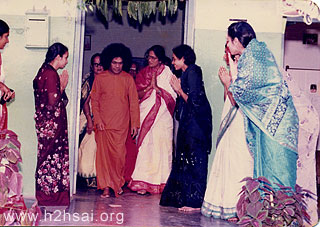 |
|
From the dinning hall to the prayer hall, giving the Lord a full tour of the hostel |
Personally, for me, all doubts about my eligibility to participate in the kumkum pooja were completely erased by Swami. Most often, it is the society and the people who make such rules that a widow cannot take part in pooja and many such unwarranted social restrictions.
In India, when a woman’s husband dies, something dies in her as well; she is stigmatised. She herself becomes conscious about her status and tries to stay away from any auspicious function. Of course, things have changed for the better now.
That day, Swami proved that He is beyond all the shastras(scriptures) and does not conform to such social taboos. He set an example to the world that all He looks for in His devotee is a pure heart and sincere service .
And, when you place yourself in His Divine hands, all your worries are taken care of by Him. I have been extremely fortunate that from the first day onwards, Swami has been there for me . Whenever I would have a problem , Swami would immediately come and talk to me.
For instance, soon after my mother-in-law passed away, I was vacillating about selling our property in Coorg, Swami realized my predicament and advised me to dispose it off. He knew that I did not like going away from Puttaparthi during the vacations and it was a problem to keep an eye on the tenants, so He made the decision for me! The property would have got me a much better price had I sold it now but to me these were secondary issues because nothing can substitute the peace I experience when staying in divine Bhagavan’s proximity.
- Heart2Heart Team
What are your impressions about this article? Would you like more such stories about exemplary personalities serving in various Sai missions? Please share your feedback by writing to h2h@radiosai.org. Do not forget to mention your name and country.





